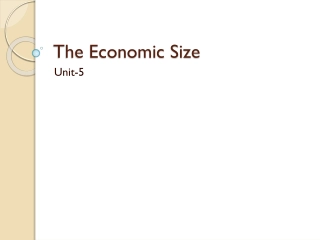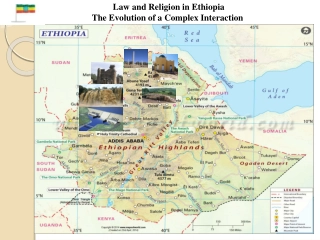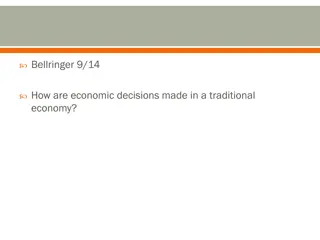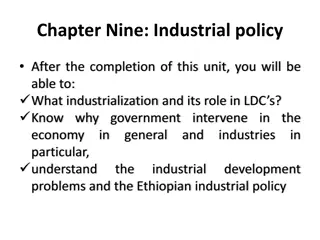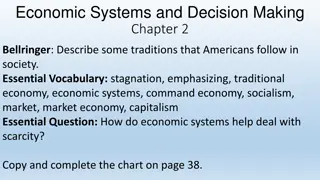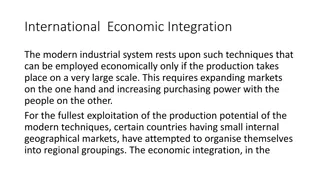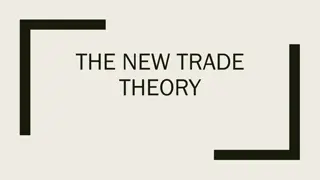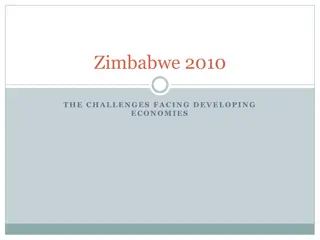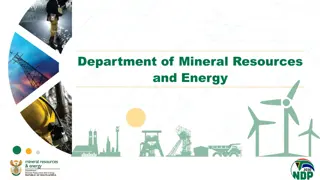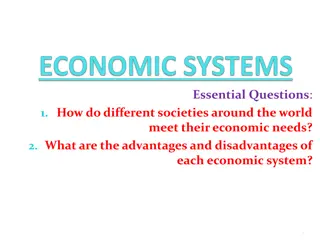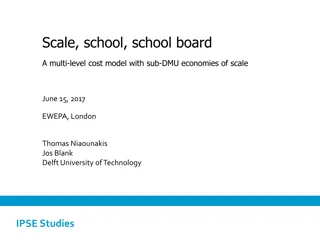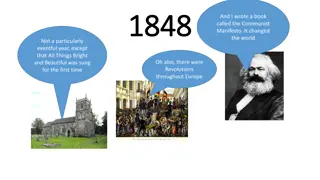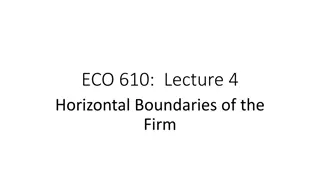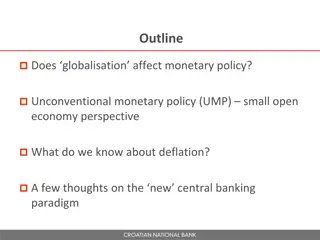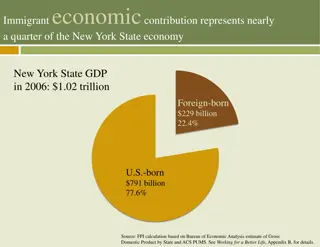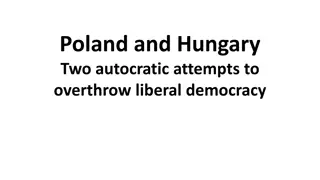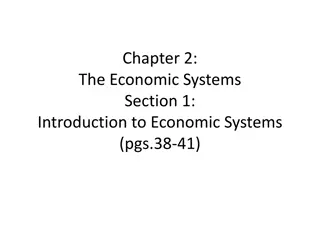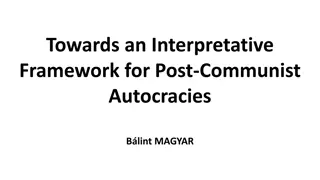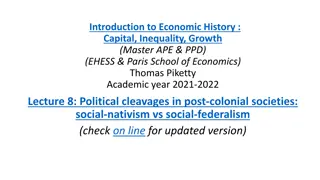The Economic Size
Economies of scale and how it can benefit businesses. Learn about the different types of economies of scale and their effects on production costs. Discover the sources that can help achieve economies of scale.
1 views • 21 slides
Understanding Shock Absorption and Fiscal Sustainability in Small Open Economies
This presentation delves into a model of output, prices, public finance, and balance of payments in small open economies. It explores the impact of macroeconomic shocks, fiscal sustainability restoration, and financial stability maintenance. The model sheds light on policy responses to varying econo
0 views • 30 slides
Law and Religion in Ethiopia: A Historical Overview
Explore the evolution of the complex interaction between law and religion in Ethiopia, from Imperial Ethiopia to the Communist Era and the post-communist period. Discover the rich historical origins of Ethiopia, including its diverse religious landscape and unique governance structures. Delve into t
0 views • 28 slides
Post Matric Scholarship for OBC Students – Puducherry
How to get Post Matric Scholarship for Obc in Puducherry\n\nThe Post Matric Scholarship for OBC Students in Puducherry for the academic year, offered by the Ministry of Social Justice & Empowerment, Government of India, is an opportunity for students in the OBC category to pursue post-matric educati
1 views • 5 slides
Understanding Global Economic Convergence Trends: Insights from Jeffrey Frankel’s Keynote at G20 Global Financial Stability Conference 2021
Jeffrey Frankel discussed the potential impact of the pandemic on global economic convergence at the G20 Global Financial Stability Conference 2021. Despite a resilient world economy in the first half of 2021, downside risks persist due to monetary and fiscal stimuli. The divergence between Emerging
2 views • 17 slides
Economic Systems in the United Kingdom, Germany, and Russia
Economic decisions in traditional economies are based on customs and beliefs. The United Kingdom has a mixed market economy with a focus on service industries, while Germany's economy is export-based. Russia's economy leans towards a command system. By comparing these economic systems, one can see h
0 views • 11 slides
Understanding Industrialization and Its Role in Developing Countries
Industrialization is defined as the process of economic development that mobilizes national resources to create a modern, diversified domestic sector capable of high growth. It plays a crucial role in transforming economies, creating job opportunities, and increasing income levels in developing coun
4 views • 26 slides
Understanding Economic Systems and Decision Making
The chapter delves into different economic systems such as traditional, command, and market economies, exploring how each handles scarcity and decision-making. It discusses traditions in American society, essential vocabulary, advantages, and disadvantages of traditional economies, and the impact of
0 views • 34 slides
Benefits of Economic Integration
Economic integration involves the unification of distinct economies into a larger economic region through the removal of trade barriers. It leads to economies of scale, international specialization, qualitative improvement in output, expansion of employment, and improvement in terms of trade. These
0 views • 33 slides
The New Trade Theory and Economies of Scale in International Trade
The New Trade Theory, emerged in the 1970s, challenges traditional trade theories by emphasizing the role of increasing returns and economies of scale in international trade. It introduces the concept of industrial organization and imperfect competition to explain how countries trade not only based
1 views • 12 slides
Token Economies and Behaviour Modification in Custody: Evaluating Efficacy
This article explores the application of token economies in prisons as a behaviour modification technique based on operant conditioning. Token economies involve exchanging tokens for desired behaviours, aiming to replace undesirable actions with positive reinforcement. The use of increments, consist
0 views • 19 slides
Political Instability of the Weimar Republic: Spartacist and Kapp Putsches
The Weimar Republic faced political instability due to uprisings like the Spartacist and Kapp Putsches, rooted in dissatisfaction with its surrender to the Allies, weak constitution, and failure to address food shortages. The Spartacist Rising of January 1919, led by figures like Karl Liebknecht and
3 views • 18 slides
Understanding Economic Systems and Their Impacts
Explore traditional, command, and market economies, and how they address economic questions. Understand the concept of mixed economies and their placement on a continuum between market and command systems. Compare economic systems in Israel, Saudi Arabia, and Turkey. Delve into essential economic vo
1 views • 17 slides
Challenges Faced by Developing Economies in Post-Conflict Zones
Addressing the economic, social, and security challenges in developing economies post-conflict, including issues such as aid effectiveness, resource dependency, governance, and civil wars. The importance of foreign investment, multilateral cooperation, and possible solutions to foster economic growt
0 views • 20 slides
Understanding Community Wealth Building for Socially Just Economies
Community Wealth Building focuses on fairer, socially just economies through progressive concepts like anchor institutions, plural ownership, and fair labor markets. It promotes broad ownership and distribution of wealth for national and international benefits, including productivity, social, and en
0 views • 28 slides
Impact of Increasing Fuel Prices on Economy and Alternatives
Global and national fuel prices have soared, impacting economies significantly. The conflict in Europe disrupts supply chains, with developing economies facing the brunt. Factors like geopolitical tensions, OPEC+ decisions, and post-COVID demand-supply imbalances contribute to the price surge. The p
0 views • 13 slides
Understanding Economic Systems and Their Impacts on Societies
Explore how different societies meet their economic needs through traditional, free enterprise, and communist economic systems. Learn about the advantages and disadvantages of each system, from the customs-based decisions in traditional economies to the government-controlled operations in communist
2 views • 17 slides
Economies of Scale in Dutch Primary Education: A Multi-level Cost Model
This paper explores economies of scale in Dutch primary education, focusing on school boards and school compositions. The study examines the impact of school size variations on cost determination at both levels, considering the challenges of limited input data availability. Different solutions are p
3 views • 16 slides
Exploring National Identity and Revolutionary Ideals in European History
In this discussion, we delve into Karl Marx's beliefs in the Communist Manifesto, the lack of Communist revolutions in the 19th century, the role of national identity in societies, and the concept of imagined communities as outlined by Benedict Anderson. Through analyzing historical events and schol
2 views • 10 slides
Global Economic Update: High-income Economies Accelerating, Developing Countries Facing Challenges
The global economic outlook presents a contrast between high-income economies accelerating in growth while developing countries encounter challenges due to headwinds and capacity constraints. Key messages highlight the need for structural reforms to enhance outcomes. Risks include fallout from the s
4 views • 34 slides
Structuration Analysis of Central Government Accounting Practices and Reforms in Emerging Economies: A Study from Nepal
Delve into the nuances of central government accounting practices and reforms in emerging economies, focusing on Nepal. The study explores why key stakeholders resist externally-driven changes, investigates the unintended consequences of reforms, and highlights the role of organizational actors in s
0 views • 21 slides
The Cold War Expansion and Nuclear Arms Race
The Cold War intensified as the Soviet Union detonated an atomic bomb, leading to heightened tensions. Communist advancements, including the takeover of communist China, shocked the world. Nuclear arsenals expanded with the development of the hydrogen bomb, sparking concerns of an arms race. Eisenho
0 views • 17 slides
Understanding Horizontal Boundaries of Firms in Economics
Exploring the concept of horizontal boundaries in firm behavior, this lecture delves into Long-run Average Cost curve, economies and diseconomies of scale, optimal plant size, and the Minimum Efficient Scale. It discusses how economies of scale affect production costs and the relationship between ma
0 views • 25 slides
Globalisation's Impact on Monetary Policy and Central Banking Paradigm
Globalisation has reshaped monetary policy dynamics, influencing inflation pressures and the transmission of shocks across economies. Unconventional monetary policies in small open economies have challenged conventional theories, highlighting the complexity of managing monetary conditions. The inter
0 views • 24 slides
Super Premium Sorbet Marketing Plan
Product Description: Super Premium Sorbet offering seven flavors including Chocolate, Cranberry Blueberry, Mango, Raspberry, Strawberry, Orchard Peach, and Zesty Lemon in a 14-ounce container. Marketed as part of the Haagen-Dazs portfolio, available in North America, Asia, South America, and Europe.
0 views • 16 slides
The Evolution from Paleolithic Societies to Agricultural Revolution
Exploring the transition from small Paleolithic societies relying on gathering and hunting to the Agricultural Revolution that brought deliberate cultivation of plants and animals. The shift marked a revolutionary transformation in human life, impacting economies, environments, spiritual beliefs, an
0 views • 12 slides
The Rosenberg Trial and the Red Scare: Cold War Espionage and Anti-Communist Hysteria
The Rosenberg Trial during the Cold War era exemplified the heightened tensions of the time, showcasing accusations of espionage, Communist subversion, and anti-American sentiment. Julius and Ethel Rosenberg faced allegations of passing atomic secrets to the Soviet Union, amid a backdrop of fear and
0 views • 14 slides
Immigrant Contributions to the New York State and City Economies
Immigrants play a significant role in the economies of New York State and City, contributing nearly one-quarter and nearly half of their respective economic outputs. They represent a substantial share of the working-age population, labor force, and GDP. Immigrants work across various job sectors, fr
0 views • 20 slides
Comparing Autocratic Attempts in Poland and Hungary
Poland and Hungary exhibit common ideological frames in their autocratic attempts, focusing on regime change rather than government shifts. These attempts utilize ethnonationalism, Euro-skepticism, and xenophobia to justify their actions. The two countries also showcase different types of post-commu
0 views • 15 slides
The Impact of the Red Scare and McCarthyism on American Society
The Cold War era saw the rise of the Red Scare and McCarthyism in America, fueled by fears of Communist infiltration. The loyalty review program, House Un-American Activities Committee, and infamous cases like Alger Hiss and the Rosenbergs reflect the intensity of the anti-Communist hysteria. Joseph
0 views • 12 slides
The Red Scare and Anti-Communist Hysteria in Post-World War II America
Americans in the post-World War II era were gripped by fears of communism, leading to the Red Scare and intense anti-communist sentiment. This period saw the rise of initiatives like the Loyalty Review Board and the House Committee on Un-American Activities, which targeted suspected communists in va
0 views • 16 slides
Insights into the Greater Bay Area Project
The Greater Bay Area project, led by Paulo Canelas de Castro, delves into the ambitious vision and planning of creating a megalopolis to drive China's advancement. The project aims to integrate economies, contribute to the world's top economies, and potentially secure a G-20 seat. It aligns with oth
0 views • 27 slides
Entrepreneurship as Empowerment: Transforming Lives and Communities
Entrepreneurship, as defined by Dr. Michael H. Morris, is the recognition and pursuit of opportunities, creating value through unique resource combinations. Empowerment through entrepreneurship enables individuals to create their own jobs, identities, futures, and contribute to the world, leading to
0 views • 30 slides
Understanding Township Economies and Apartheid Border Industry Policies
Township economies consist of diverse enterprises predominantly characterized by informality and survivalist nature, with a significant number not lasting beyond 3 years. These economies have birthed successful black entrepreneurs, transitioning from serving exclusively the township market. On the o
0 views • 17 slides
A Brief History of Communism: From Capitalism to Karl Marx's Vision
The history of communism traces back to the capitalist system's exploitation of workers in the mid-1800s. Karl Marx's vision, outlined in "The Manifesto of the Communist Party," aimed for economic equality and worldwide revolution. The inherent flaws of capitalism were critiqued, leading to the rise
0 views • 17 slides
Economic Transition in Post-Communist Countries: A Quarter Century Review
This presentation by Oleh Havrylyshyn explores the progress and performance of post-communist economies since the fall of the Berlin Wall in 1989. It compares different countries' approaches to marketization, privatization, economic performance, and political transformation. The analysis highlights
1 views • 28 slides
Macroeconomic Policy Framework for Structural Transformation of African Economies
Structural transformation is essential for the development of African economies, involving shifts towards higher productive activities and inclusive growth. The process requires purposeful efforts to create articulated economies with coordinated economic activities and positive externalities. Emphas
0 views • 13 slides
Understanding Different Economic Systems
Introduction to economic systems reveals how societies address scarcity by determining what to produce, how to produce, and for whom. Traditional, command, market, and mixed economies are explored, highlighting their distinct approaches. Traditional economies rely on customs, command economies are g
0 views • 9 slides
Framework for Understanding Post-Communist Autocracies
The illusion of linear progress towards liberal democracies post-1989-1990 revolutions is challenged by the complex reality of post-communist autocracies. This framework explores the characteristics of democracy, autocracy, and dictatorship to categorize regimes, highlighting the challenges and nuan
0 views • 41 slides
Political Cleavages in Post-Colonial Societies: Social-Nativism vs. Social-Federalism
This lecture explores the shifting political cleavages in post-colonial societies, focusing on the rise of social-nativism and social-federalism. It examines the reversal of the education cleavage in Western democracies, the emergence of social-nativism in post-communist Eastern Europe, and the chan
0 views • 30 slides
